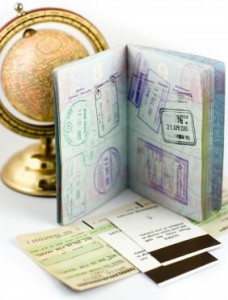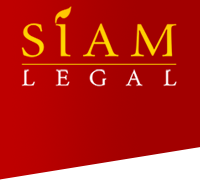Applying for a IR-1 Visa from Thailand
 Are you a United States citizen with a Thai spouse? Or did you get married in Thailand? Would you like to move back to the United States together? The IR-1 visa application process allows an American citizen to sponsor their foreign born spouse for permanent residency.
Are you a United States citizen with a Thai spouse? Or did you get married in Thailand? Would you like to move back to the United States together? The IR-1 visa application process allows an American citizen to sponsor their foreign born spouse for permanent residency.
If you and your spouse have been married for more than 2 years, you can apply for a IR-1 visa. Your spouse becomes a permanent resident automatically after entering the U.S.
If your spouse is a Thai citizen or if you got married in Thailand, your spouse will apply for the IR-1 visa from Thailand. The application process takes approximately six months to a year from start to finish. Once the visa is approved, your spouse can enter the United States and is free to work or study. The green card will arrive in the mail after a few months.
If your spouse has children, they will be able to immigrate with your spouse by applying for a IR-2 visa. Any of your biological children may be U.S. citizens already. To confirm the child’s citizenship and apply for a passport, register their birth at a U.S. Embassy.
.
Should We Apply for a K3 Visa or IR-1 Visa?
If you would like to bring your spouse to the United States as soon as possible, you should apply for a K3 visa instead of a IR-1. K3 visa applications are usually processed about two months faster than IR-1 applications.
But a K3 visa has downsides. Your spouse will have to apply for work authorization before they can get a job. Once your spouse arrives in the United States, you will need to apply for “adjustment of status” to get your spouse a green card.
If you choose to apply for a K3 visa instead of an IR-1, your spouse may be able to enter the United States a little sooner, but the overall immigration process will be longer and more expensive. However, in some cases a K3 visa application will be converted to a IR-1 application during processing. If so, you will be provided with new instructions.
.
Eligibility Requirements
You must be a U.S. citizen and at least 18 years of age to sponsor your spouse for an IR-1 visa. U.S. permanent residents must use a F2 visa to sponsor their spouse.
Your spouse will be ineligible for any type of visa if they have ever lied on an immigration application, if they have a serious criminal record, or if they have a severe communicable disease. In some cases there may be a waiver to allow your spouse to obtain a visa even with an ineligibility.
.
Income Requirement
To show that your Thai spouse will not require welfare once they arrive in the United States, you must demonstrate that your annual household income is at least 125% of the poverty line. If you are member of the U.S. Armed Forces on active duty, the requirement is that your income be 100% of the poverty line. If you and your spouse will be living in the 48 contiguous states and your household will consist of only the two of you, the minimum annual income (as of 2011) is $18,388. The more members of your household, the higher the minimum requirement will be. If you will live in Alaska or Hawaii, the required annual income is slightly higher.
If you make less than the required minimum income, you can make up the difference by demonstrating assets (real estate, stocks, bonds, bank accounts) that are at least 5 times the difference between the income required and your annual income. If you have an annual income of $17,288, for example, you can satisfy an $18,388 income requirement by showing that you have $5,500 ($1,100 x 5) in the bank.
.
IR-1 Application Process
Step 1: Filing an I-130 Petition
To start the IR-1 visa application process, fill out and submit Form I-130, which is also known as a “Petition for an Alien Relative.” When you file the I-130 you will need to prove you are a U.S. citizen, and attach a copy of your marriage certificate and passport-size photos of both you and your spouse.
You also need to attach evidence that shows your marriage is legitimate, such as documents that show you share bank accounts or property, a lease showing you live together, or affidavits from friends confirming your marriage is heartfelt. If either you or your spouse was previously married, you have to attach a divorce decree, annulment, or death decree to show that you were free to enter your present marriage.
Send the I-130 petition and supporting documents to the U.S. Citizenship and Immigration Services (USCIS) Lockbox in Chicago for processing. Or if you are living in Thailand, you may file the I-130 at the USCIS with the U.S. Embassy in Bangkok. Make sure you keep copies of all the documents you send with the I-130 because you will need them later in the visa application process. When USCIS receives your I-130 they will send you Form I-797 confirming that they are processing your petition.
.
Step 2: Processing at the National Visa Center (NVC)
Once USCIS processes and approves your I-130 petition it will be forwarded to the National Visa Center (NVC) for further processing. The National Visa Center will send you an instruction packet with visa application forms. Follow the instructions carefully. Along with the completed application, your spouse will need to provide a copy of their passport, 2 passport photos, certified copies of birth and marriage certificates, a police certification certificate from anywhere your spouse has lived, and any military service records. You will have to file the Form I-864 Affidavit of Support to prove that your spouse will not need government support. The National Visa Center also collects visa application fees.
.
Step 3: Interview and Medical Exam
When your application is complete, the National Center will schedule an interview at the US Embassy in Bangkok. Before the interview the visa applicant must complete a medical examination, which can be conducted at designated locations in Bangkok and Chiang Mai.
.
Category: US Immigration, US Spouse Visa
About the Author (Author Profile)
Siam Legal is a full service law firm but it has an extensive range of immigration, corporate, and real estate experience accessible to clients both domestically and internationally. It has offices strategically located throughout the major cities in Thailand including Chiang Mai, Pattaya, Hua Hin, Samui and Phuket along with international representative offices in Australia, London and Las Vegas.










